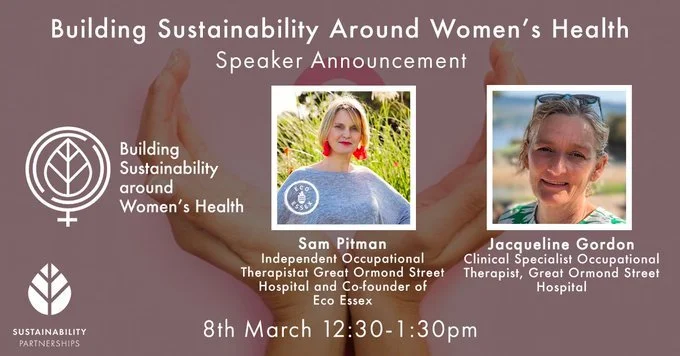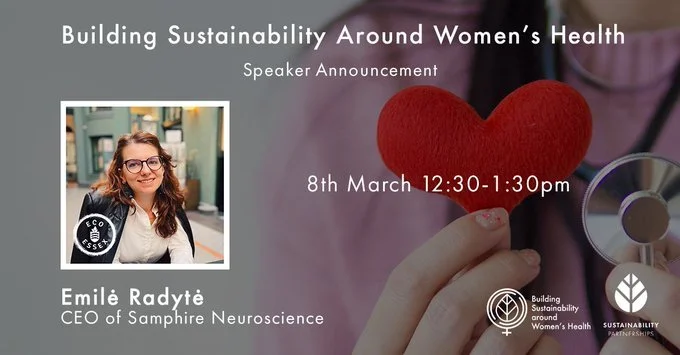Building Sustainability Around Women’s Health
Real sustainable development will only be possible if women’s health is prioritised. For many years, the majority of new medical devices, technologies and services have been developed around being used for men, leaving many women’s health needs unconsidered and a significant gender bias issue. But now, new activity in relation to women’s HealthTech is increasing at an astronomical rate. To celebrate International Women's Day, we invited a range of industry experts and NHS Professionals to discuss the need for women’s health to be at the centre of sustainable development.
Our Speakers Included:
Sam Pitman, Independent Occupational Therapist and Co-Founder of Eco Essex
Jacqueline Gordon, Clinical Specialist Occupational Therapist at Great Ormond Street Hospital
Emilė Radytė, CEO of Samphire Neuroscience
Sam Pitman, Independent Occupational Therapist and Co-Founder of Eco Essex
After an inspiring introduction to the state of women’s health by our hosts Georgia Halston, Group CEO at Halston Group, and Nathan Swinson Bullough, Managing Director at Imageco, the panel was kicked off by Sam Pitman, Independent Occupational Therapist and Co-Founder Eco Essex and Jacqueline Gordan, Clinical Specialist Occupational Therapist at Great Ormond Street Hospital.
Sam began by giving us a rundown on the number of more sustainable alternatives currently available outside of the traditional plastic-filled tampons. With options such as disability-inclusive period pants and non-toxic menstrual cups, Sam made asked the important question- why aren’t these products more widely used within mainstream medical environments?
“A tampon applicator is used for approximately 10 seconds on average and as they are made of plastic, they will be with us forever...there are so many alternative reusable options out there. ”
Jacqueline Gordan, Clinical Specialist Occupational Therapist at Great Ormond Street Hospital.
This was then backed up by Jacqueline Gordan who took us through the wider impact the high use of plastic in menstrual health has on our planet, as well as how the UK’s largest paediatric facility is working to make female patient care more sustainable and comfortable.
“[The onscreen graph] shows the carbon difference between a cup which has 0.5 kg of co2 per person per year, whereas tampons have between 7.4 and 7.6... and so if you think about over a lifetime that’s quite a lot.”
Emilė Radytė, CEO of Samphire Neuroscience
Next, we welcomed Emilė Radytė, CEO of Samphire Neuroscience, who explained how the London FemTech Space is working to improve women’s health and lives. Her work with Samphire Neuroscience in particular is working to eliminate the negative symptoms relating to their menstrual cycle.
“If you look at what women are most annoyed by during their periods, one of them is definitely menstrual pain, but four out of five of the symptoms are actually mental health symptoms.”
“We love to see tech leading the way here at Sustainability Partnerships and I think it is way more commonplace now to be using tech to augment their understanding of their cycles.”
After hearing from all of our panellists, our online event was wrapped up by Georgia Halston with a finishing thought on how tech is revolutionising women’s health
Want to learn more about how the face of healthcare is changing? Join our Earth Day webinar “Investing in our Planet” and learn about the innovative products and services that could benefit the NHS’s green agenda.



